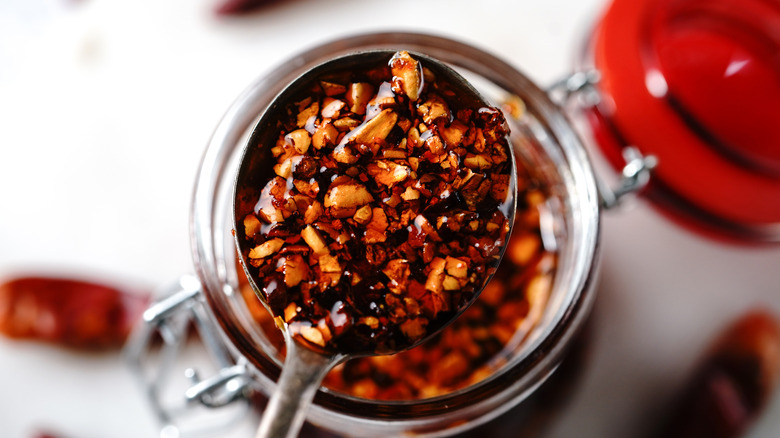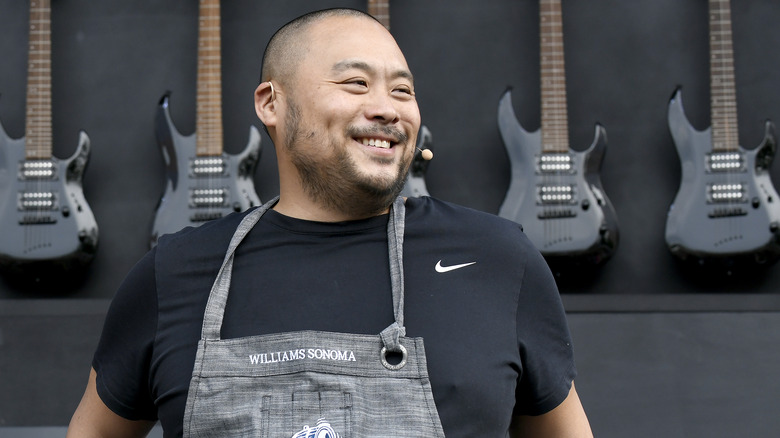Momofuku's Fight Over Chili Crunch Sauce
David Chang, the owner of Momofuku (which means "lucky peach" in Japanese), has admitted to being a bully in the food world. Hannah Selinger, a former Momofuku employee, detailed to Eater how abusive and angry Chang could be at work. And it seems the intimidation goes beyond the restaurant walls. The Guardian, on April 4, 2024, reported a rather ridiculous case of trademark bullying, exposing Chang's restaurant Momofuku for allegedly sending cease-and-desist letters to other Asian-owned brands like Homiah and Eat Mila, which makes our favorite frozen soup dumplings.
The reason? These brands sell chili crisp condiments labeled either with the words "chili crunch" or "chile crunch." While Momofuku does own the trademark rights to "chile crunch," it does not own the rights to the term "chili crunch," spelled with an i. But that could potentially change. On March 29, 2024, Momofuku applied to also trademark the term "chili crunch" with the U.S. Patent and Trademark Office (USPTO). A trademark filing usually takes about 12 to 18 months to process, and the USPTO may not even grant the trademark to Momofuku. So why are Chang and Momofuku sending out cease-and-desist letters when it doesn't even own the trademark yet?
As Cornell Law School explains, a cease-and-desist letter is "a cautionary letter sent to an alleged wrongdoer... written by attorneys and are often sent to stop alleged or actual... trademarks..." These letters usually have no binding or real legal effect and are often used as a scare tactic, though they are meant to provide "notice that legal action may and will be taken if the conduct in question continues." Momofuku's cease-and-desist letters reportedly demand that brands stop marketing with the term "chili crunch" within 90 days, eliciting fear and disappointment from these smaller, lesser-known companies.
A ridiculous case of trademark bullying
By stopping other brands now from using "chili crunch" in their branding and marketing, Momofuku, which sells "Momofuku Chili Crunch," hopes to ensure the USPTO it has the sole rights to the trademark, which would no doubt allow a certain degree of dominance in this growing market. But the issue is that filing a trademark for a descriptive term like "chili crunch" is equivalent to trying to file a trademark for "chocolate bread" or "mochi muffins." With exceptions, like with the term "chile crunch" spelled with an e unfortunately, the USPTO rarely grants trademarks for these types of general descriptive terms.
And more concerning is that there could be far-reaching consequences. This isn't the first time Momofuku has engaged in a trademark dispute or sent out cease and desist letters. In 2022, Momofuku sued a Manhattan restaurant, Yuzu Kitchen, for allegedly infringing on Momofuku's "Lucky Peach" trademark design: an orange peach with green leaves. By August 2022, Momofuku had voluntarily dismissed all claims against Yuzu Kitchen. But today, Yuzu Kitchen has permanently closed, and Momofuku remains a conglomerate.
What's the solution?
Chang, at the helm of Momofuku, has an estimated net worth of $60 million dollars. What's it to him and Momofuku to spend a bit on lawyers to send threatening cease-and-desist letters to smaller AA and NHPI-owned brands to ensure domination on the "chile crunch" and "chili crunch" market? Those brands more than likely can't afford to face any real legal action that could potentially follow and may be inclined to simply bow to Momofuku's requirements.
The demand for chili crisp condiments makes it a market worth billions of dollars. In our honest opinion, there's a solution where everyone will be happy — Momofuku reconsiders its bullying tactics and rebrands its current product to Chile Crunch, which it already owns the trademark for.
Momofuku did not respond to Tasting Table's requests for comment.


